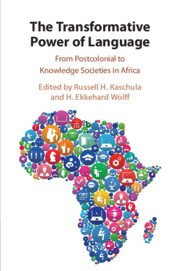Book contents
- The Transformative Power of Language
- The Transformative Power of Language
- Copyright page
- Contents
- Figures
- Tables
- Contributors
- Preface
- Abbreviations and Acronyms
- Introduction
- Part I Mental Decolonisation and Cultural Diversity
- Part II Multilingualism and Intellectualisation of African Languages
- Part III Digitalisation and Democratisation of Knowledge
- Part IV Interlingual and Intercultural Cross-Fertilisation
- Index
- References
Introduction
Transformative Power and Resourcefulness of African Languages in the Information and Knowledge Age
Published online by Cambridge University Press: 18 September 2020
- The Transformative Power of Language
- The Transformative Power of Language
- Copyright page
- Contents
- Figures
- Tables
- Contributors
- Preface
- Abbreviations and Acronyms
- Introduction
- Part I Mental Decolonisation and Cultural Diversity
- Part II Multilingualism and Intellectualisation of African Languages
- Part III Digitalisation and Democratisation of Knowledge
- Part IV Interlingual and Intercultural Cross-Fertilisation
- Index
- References
Summary
This chapter serves as general introduction to clear the ground and explore the transformative nature of language in relation to knowledge creation and how it relates to current and burning issues of (mental) decolonisation in postcolonial Africa. It centres around language as a key factor, particularly in higher education at university level, with due recognition of strategies for the intellectualisation and re-empowerment of formerly dis-empowered languages under the colonial regime, encompassing digital literacy, translations from and into African languages and challenges for lexicography. It outlines the overall structure of the book and provides chapter summaries.
Keywords
- Type
- Chapter
- Information
- The Transformative Power of LanguageFrom Postcolonial to Knowledge Societies in Africa, pp. 1 - 30Publisher: Cambridge University PressPrint publication year: 2020

